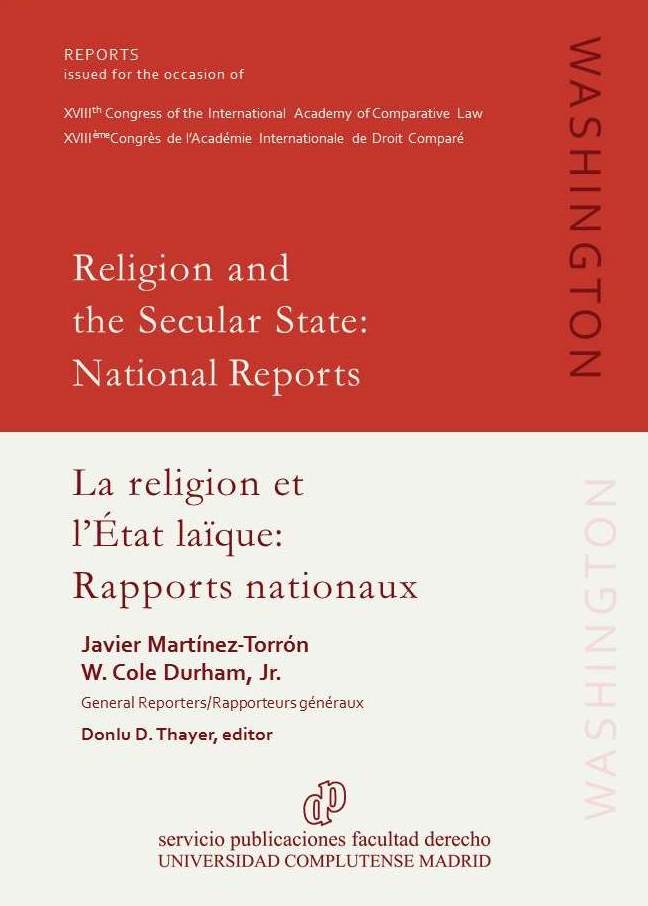





The General Reporters, Javier Martínez-Torrón of the Law Faculty of Complutense University in Madrid and Professor W. Cole Durham, Jr., Director of the International Center for Law and Religion Studies at Brigham Young University, along with Donlu Thayer, project editor, are pleased to announce the publication in final form (July 2015) of the National Reports prepared on this topic "Religion and the Secular State" for The 18th Congress of the International Academy of Comparative Law, held in Washington, DC in July 2010.
The Congress is the once-every-four-years meeting of the experts of the International Academy of Comparative Law. The 18th Congress was the first of this nearly 100-year-old Academy to be held in the United States. The Reports prepared on the the topic Religion and the Secular State for this occasion by 58 experts from 47 countries were published in interim form in 2010 by the International Center for Law and Religion Studies, for review by authors and other interested parties. Many reports have now been updated by the authors and the editor for this final 900-page publication, which has been issued by the press of the Law Faculty of Complutense University in Madrid. The occasion for the publication was The 19th International Congress of Comparative Law, held in Vienna in July 2014.
Information about the book:
Recent years have seen religion assume an increasingly visible place in public life, with mixed results that have been aptly described in terms of the "ambivalence of the sacred". Every state adopts some posture toward the religious life existing among its citizens. That posture is typically contested, leading to constant adjustments at the level of constitutional and statutory law, as well as constantly evolving judicial and administrative decisions. While some states continue to maintain a particular religious (i.e., non-secular) orientation, most have adopted some type of secular system. Among secular states, there are a range of possible positions with respect to secularity, ranging from regimes with a very high commitment to secularism to more accommodationist regimes to regimes that remain committed to neutrality of the state but allow high levels of cooperation with religions. The attitude toward secularity has significant implications for implementation of international and constitutional norms protecting freedom of religion or belief, and more generally for the co-existence of different communities of religion and belief within society. Not surprisingly, comparative examination of the secularity of contemporary states yields significant insights into the nature of pluralism, the role of religion in modern society, the relationship between religion and democracy, and more generally, into fundamental questions about the relationship of religion and the state.
This book contains national reports on the topic "Religion and the Secular State" from 58 reporters representing 43 countries, plus a general report written by Professors W. Cole Durham, Jr. and Javier Martínez-Torrón. The reports, originally prepared for the 18th World Congress of the International Academy of Comparative Law, were published in Interim form in 2010. This final volume, with updated and sometimes extensively modified reports, was prepared to coincide with the 19th Congress in Vienna in July 2014.
The topic "Religion and the Secular State", if construed too broadly, could conceivably cover virtually every subject relating to law and religion. For that reason, the general reporters asked the national reporters to focus on a number of recurring tension points in the relationship of religion and the state: (1) the general social context; (2) the constitutional and legal setting; (3) religious autonomy (and autonomy of the state from religion); (4) legal regulation of religion as a social phenomenon; (5) state financial support for religion; (6) civil effects of religious acts; (7) religion and education; (8) religious symbols in public places; and (9) tensions involving freedom of expression and offenses against religion. Keeping in mind the variety of national circumstances, the aim has been to obtain a picture of the solutions provided by different countries to basically the same overarching problem: how the secular state deals with religion or belief in a way that preserves the reciprocal autonomy of state and religious structures and guarantees the human right to freedom of religion and belief.
This volume has been published by the Publishing Service of Complutense University Law School, thanks to the financial and editorial contributions of the International Center for Law and Religion Studies of Brigham Young University.
The book may be ordered directly from the publisher at [email protected].
